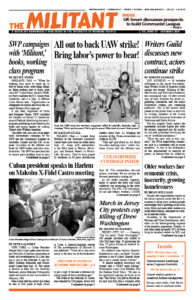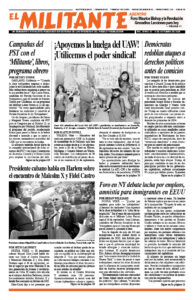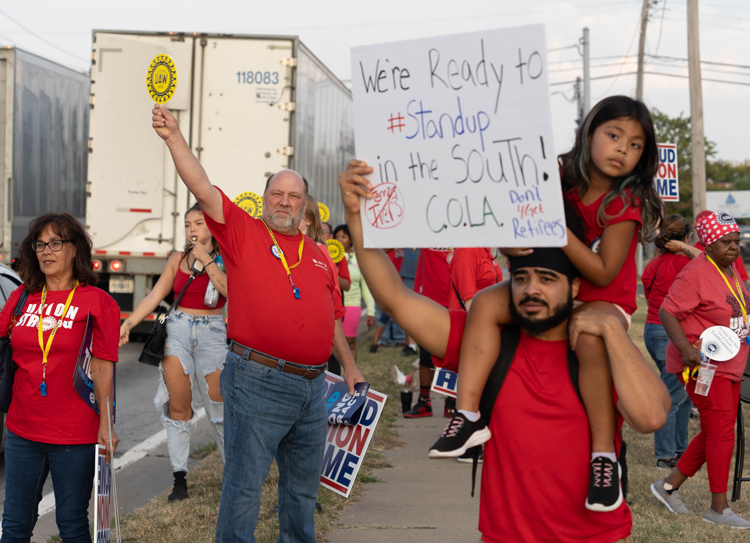TOLEDO, Ohio — United Auto Workers at the Stellantis Assembly Center here have been on strike since Sept. 15, along with autoworkers at the Ford plant in Wayne, Michigan, and General Motors in Wentzville, Missouri. They’ve been joined by walkouts at 38 parts distribution centers since Sept. 22, bringing the number of Big Three autoworkers on strike to 18,300.
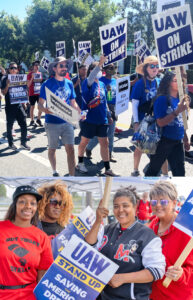
“This isn’t just about us, it’s about the entire working class,” striker Antonio Schutz told the Militant here Sept. 18. “The steelworkers, the coal miners, everyone. We are uniting for the new generation coming up.”
As the strike expands, opportunities to spread the word and build solidarity are increasing in the labor movement. The AFL-CIO and unions of rail and bakery workers, UNITE HERE and more have urged members to join UAW picket lines. Support from fellow unionists is key to a union victory.
The UAW is demanding the elimination of divisive tiers — including long-term temp workers with rock bottom wages and no benefits — a 40% wage increase, restoration of cost-of-living adjustments, a pension for all workers, an increase in retiree pay, and more paid time off to spend with families.
“I’m not even making $18 an hour yet,” temp worker Tanya Nikolakos, who started three years ago, said. “I work next to people making $32 an hour.”
“Temporary workers barely get any time off. We’re fighting for them and for the retirees,” said striker Ashlee Baxter. “They expect your life to revolve around Jeep. One week you work 10 or 12 hours a day for six days, the next week only two or three days. You can’t get a second job because you can’t plan.”
“I don’t care how long you’ve been here, you deserve everything we get,” Shannon Hickle-Wyatt, a full-time worker, added. “We all do the same work.”
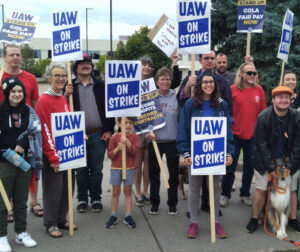
She pointed out the UAW is asking for conditions the bosses took back from the union during the 2008 financial crisis. “We used to have cost-of-living adjustments. They made us cut all that to ‘save the company.’ This is a hard job, people get divorced because of the stress. A lot of times we work so much our children don’t know where we are. This strike isn’t what we wanted to do, it’s what we had to do.”
Angie McLaughlin, with 10 years at Jeep, was the picket captain. “They blame workers for on-the-job injuries. I was written up when my finger was smashed because of faulty equipment.”
“Safety is a union issue,” Hickle-Wyatt said. “They try to retaliate against people and we have to stick up for each other. Especially for temp workers who can sometimes feel more intimidated. That’s really why we have to fight to end the tiers.”
“Stellantis now has a leasing program for its workers because they know it’s the only way most workers today can afford their cars,” Brian Sims, vice president of Local 12, told the Militant.
Strikers at the plant are organizing car caravans to join picket lines at other plants where workers are on strike. One union member was going from gate to gate to sign up volunteers to help with child care, give rides to fellow unionists and to cook meals.
Temps get less pay, no sick pay or vacation
WENTZVILLE, Mo. — “I’ve been here for a year and don’t know when I’ll get on permanent,” Katrina Donelson, a member of UAW Local 2250 picketing outside the sprawling GM assembly plant here, told the Militant Sept. 20. “We work as hard as everyone else, but we don’t get sick days or vacation. We don’t get vision or dental insurance.”
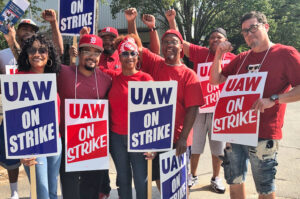
Donelson said she’s paid $16.67 — barely half of the full pay of $32.32 an hour. And after you become permanent, you start what’s currently an eight-year wage progression to reach full pay.
“We need to get fair treatment for everyone,” Jim Moran, with 28 years seniority, told the Militant. “They treat the new people like garbage. When I started, it only took 90 days to become permanent, and three years to reach full scale. We gave up all kinds of benefits for their bankruptcy in 2009, and now they’re making money hand over fist.”
“We need cost-of-living raises,” said Monica Jones, who’s worked at Wentzville for eight years. “It’s not right we have to wait for the contract to get a raise.”
The UAW hall down the street from the plant is bustling with strikers and supporters coming by to donate supplies. Shuttle vans run around the clock taking pickets to and from the five plant entrances.
— Naomi Craine
Shifts and overtime make it ‘impossible to plan anything’
LANGHORNE, Pa. — “We work six days a week, 10 to 12 hours a shift, and occasionally Sunday,” Alicia Gertslauer, financial secretary of UAW Local 2177 told the Militant at the picket line at GM’s parts distribution center here. “But we don’t know ahead of time when we start work. They only let us know the day before. On night shift, they don’t tell us how long we will be staying until we get to work. It makes it impossible to plan anything!”
The unionists had set up a large tent and a campfire to keep dry while they picketed in the rain Sept. 24. Striking members of the Screen Actors Guild-American Federation of Television and Radio Artists had visited the picket line earlier.
“We used to have 200 workers at this facility, but now it’s around 80, and we do the exact same amount of production,” striker Danny Mendoza said. “We run up and down the lines picking parts like crazy. I count from 15,000 to 20,000 steps a day. And that’s on bare concrete!”
Mendoza said a key issue is eliminating the pay tiers. Workers start at $17 an hour, and after 10 years they max out at $25. But senior workers are making $28. This is the first strike for many workers here. “They are so excited about this!” said Gertslauer.
— Janet Post
Calif. parts workers fight to end tiers and outsourcing
ONTARIO, Calif. — “Prior to the pandemic, workers here got full hours, including overtime. Now, many workers get less than 40 hours and are sent home early,” striking UAW Local 230 President Jesse Ramirez told the Militant outside Stellantis’ Mopar parts facility Sept. 23.
Local 230 has extended its picketing to a nearby operation called Cross-Dock. The company uses this facility, staffed mainly by temp workers at minimal pay, to try to circumvent the unionized Mopar plant, Ramirez said. So the unionized workforce there has been slashed.
Some 25 members of UAW locals 2865 and 5810, representing graduate teaching assistants at nearby campuses, joined the picket line.
— Norton Sandler
‘I began at $15.74 an hour 29 years ago, today it’s $15.78!’
TAPPAN, N.Y. — Pouring rain did nothing to dampen the spirits of striking UAW members on the picket line at the Stellantis parts distribution center here Sept. 24. “Everything is going up except our wages,” Celeste Miller, chair of UAW Local 3039, told the Militant as passing drivers honked in support.
Miller is a parts picker who started at the center 29 years ago. “I began at $15.74 an hour. Nearly 30 years later the starting wage is only $15.78!” she said. “Two-tier wages mean workers are living paycheck-to-paycheck. Some workers have second jobs at Uber, DoorDash and Amazon just to survive. Others work overtime every day.”
“Prices have gone through the roof,” said Jeffrey Purcell, a parts picker and Local 3039’s president. “The working class is being made to pick up the tab by the employers.”
The 65 UAW members here picket 24/7. “People are dropping off food, snacks and water for us all the time,” Miller said.
— Terry Evans
Texas: ‘We prepared for two years for this strike’
ROANOKE, Texas — “When we walked out of the plant we all had red UAW T-shirts on, blowing air horns and whistles,” Adam Martinez, chair of UAW Local 816 at the GM parts center here, told the Militant. “About 45 walked in a group. The main reason we are striking is the two-tier system. Traditional employees make $32 and the new employees doing the exact same work make $17 an hour.
“For two years workers here were putting money away,” he said. “When we struck GM in 2019 a lot of the younger workers had never been on strike and weren’t prepared. This time is different.”
— Alyson Kennedy
UAW strikers in Nevada: ‘We’re going to win!’
RENO, Nev. — “We are going to win!” said Michael Marszalek, picket captain and second shift committee man at the General Motors parts distribution center here Sept. 23.
Workers from the American Federation of State, County and Municipal Employees, railroad workers and representatives from the Reno Federation of Labor had come to support the strike that day.
“There’s a big turnover because many workers quit,” Marszalek said. “The company can force you to work 10 hours a day. Some weeks are seven days long. You have no time for your family.
“We know that our strike isn’t just for us,” he added. “When we win it will benefit the entire labor movement.”
— Jeff Powers
Autoworkers ‘can’t afford to start a family’
HUDSON, Wis. — “These new kids just starting here can’t afford a car, to start a family, to pay rent. Working in the auto industry used to be a gold standard, I was able to raise two kids,” said Rob Dolney, a striker at the GM distribution facility here.
“The company says it’s all about ‘equity,’ but not when it comes to their workers. A good paying job should be here for the next generation,” Dolney said.
Steve Frisque, president of UAW Local 722, described the concessions the union has taken. The starting wage at the plant was $19 an hour in 2007. Today it’s $17. “We have to fight to get what we need,” Frisque said. “The company won’t give anything without a struggle by the workers.
“Solidarity is important to increase the confidence of the workers,” he said.
— Gabrielle Prosser
‘Workers need to come together, fight for what’s needed.’
MORROW, Ga. — “The time is critical, not just for the UAW, but for workers all over the world to come together and fight for what is owed us,” Fidel Williams, a second shift order picker, said at the Stellantis parts distribution plant here Sept. 22.
“Now is the time to get rid of the two-tier setup that created divisions and a grotesque hierarchy among our union brothers and sisters.”
An official from the Teamsters union came to tell strikers UPS drivers would be honoring their picket line.
— Janice Lynn
